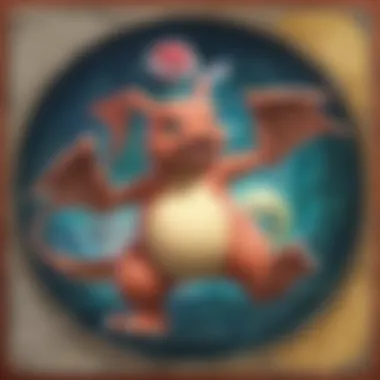Exploring the Online Pokemon Trading Card Game


Intro
The online Pokémon Trading Card Game (PTCGO) has reshaped how players interact with the beloved franchise. It allows enthusiasts to dive into battles and strategies from anywhere in the world, breaking the traditional constraints of physical card gaming. In this guide, we will explore the mechanics and strategies that define the game, as well as the unique community that has developed around it. By understanding its evolution and intricacies, players can enhance their skills and fully engage with the vibrant world of Pokémon.
Pokémon Game Overview
History of Pokémon games
The Pokémon franchise began in the late 1990s. Its origin can be traced back primarily to the Pokémon Red and Green games released in Japan in 1996. The simplistic yet engaging gameplay enticed many players. Over time, various versions have been developed, including spin-offs and adaptations like Pokémon Go and the Pokémon Trading Card Game.
Evolution of gameplay mechanics
Originally, Pokémon games focused heavily on battling and collecting creatures. As the franchise expanded, additional mechanics were introduced. For example, strategic elements in card play, such as special abilities and attack types, enriched the gameplay experience. PTCGO brought these dynamics into a digital format, allowing for swift matches and easy tracking of progress.
Prolusion to different game versions
The PTCGO is not the only digital adaptation of Pokémon. There are several versions of Pokémon games:
- Main series games: Games like Pokémon Sword and Shield focus on exploration, capturing, and battling Pokémon.
- Spin-off games: Titles such as Pokémon Mystery Dungeon and Pokémon Battle Revolution offer alternative gameplay styles.
- Mobile games: Pokémon Go demonstrates augmented reality and community engagement with local players.
Each version brings its unique focus but remains rooted in the fundamental principles established in the early days.
Tips and Strategies
Beginner's guide to Pokémon games
New players may find themselves overwhelmed. Starting with simpler decks or practicing against the AI can reduce stress. Familiarize yourself with card names, types, and potential synergies between Pokémon.
Advanced gameplay tactics
For seasoned competitors, understanding meta-game strategies is crucial. Knowledge of commonly used decks can provide insights into counters and improvements. Building a flexible deck allows adaptation based on opponents.
Team building strategies
Creating an effective team revolves around balance. Consider mixing different energy types and abilities for a well-rounded approach. Here are three key tips:
- Integrate Pokémon with complementary abilities.
- Utilize trainers that support your team’s play style.
- Keep an eye on your energy distribution to maintain momentum during matches.
Character Spotlights
Featured Pokémon profiles
Understanding specific Pokémon characteristics can enhance strategy. Each Pokémon has unique traits, including special attacks and resistances. Notable characters like Pikachu and Charizard not only provide nostalgic value but also yield tactical advantages in play.
Analysis of popular characters
The effectiveness of certain cards can shift with gameplay updates. High-damage dealers may lose relevance as new cards are released, while support Pokémon remain pivotal in specific strategies. This constant evolution keeps the community engaged and ensures meta diversity.
Impact of characters on gameplay
Characters often affect not only individual outcomes but the broader dynamics of the community. Changes in a Pokémon's popularity can lead to strategies adapted around them, making it essential to keep tabs on trending characters.
Latest News and Updates
Recent game releases
Updates and new expansions contribute to the longevity of PTCGO. Recently, new card sets have been introduced, expanding options for players and providing fresh challenges.
Patch updates and events
Regular patches ensure balance and introduce new mechanics. These updates improve user experience and playability. Events such as tournaments foster community spirit and offer opportunities for recognition.
Rumors and speculations


The speculation around upcoming expansions or card nerfs adds excitement to the community. Forums and social media platforms act as hubs for enthusiasts to discuss potential leaks and share insights.
Staying updated can give players the edge in competitive play, allowing them to anticipate changes and prepare accordingly.
In summary, by diving into the online Pokémon Trading Card Game, players can appreciate its depth and complexity. With the right knowledge and strategies, improvement is achievable, regardless of the starting point.
Prelude to the Online Pokemon Trading Card Game
The Online Pokemon Trading Card Game (PTCGO) serves as a digital manifestation of a beloved physical game. Its significance extends beyond mere entertainment; it represents a confluence of technology and nostalgia for fans of all ages. PTCGO revolutionizes how players engage with the Pokemon universe, offering accessibility, community interaction, and an evolving gameplay experience.
In PTCGO, players can build and refine decks, engage in battles, and participate in events—all from the comfort of their homes. This adaptation to a digital format has broadened the audience, allowing both casual and competitive players to connect with others worldwide through platforms that were previously unavailable in the traditional card format.
Historical Context
The roots of the Pokemon Trading Card Game date back to the late 1990s. With a rich history intertwined with the video games, animated series, and general Pokemon franchise, the cards gained significant popularity. Over time, the card game transitioned to digital platforms, with the first version of PTCGO launching in 2011. This shift marked a crucial moment, where the game expanded its reach, allowing players to gather online, trade cards, and strategize in a more connected environment.
Evolution of Card Games
The digital rendition did not just serve to replicate the experience of physical cards; it enhanced gameplay with interactive elements. Players could practice against bots and learn game mechanics without the pressure of real-time opponents. The ease with which new players can learn the game propelled the popularity of PTCGO.
The Rise of Digital Card Games
The emergence of digital card games, such as Hearthstone and Magic: The Gathering Online, paved the way for platforms like PTCGO. This wave established a digital culture surrounding card games, inviting a new generation of players into the fold. People appreciate the convenience of digital play, where they can find opponents instantaneously.
Furthermore, these games often feature built-in tutorials. The ease with which players can learn rules and strategies makes the digital format particularly attractive. Players can also participate in online tournaments without geographical restrictions.
Key Benefits of Digital Card Games:
- Accessibility: Players can engage anywhere, any time.
- Community Building: Online features foster camaraderie among players.
- Dynamic Updates: The ability to quickly implement changes keeps the game fresh and engaging.
- Environmental Considerations: Digital games reduce physical waste associated with card production.
Overall, the online take on the Pokemon Trading Card Game is not just a more accessible alternative; it's a pivotal evolution in how card games engage players and encourage interaction within the community.
Understanding the Mechanics of PTCGO
The mechanics of the Pokemon Trading Card Game Online (PTCGO) are crucial for both new and experienced players. Knowing these mechanics can dramatically improve one's overall gaming experience. This section breaks down essential aspects of the game, detailing how to set up, the rules of play, and the various card types and their abilities. Familiarity with these elements serves as a foundation for effective strategy formation and advanced gameplay.
Game Setup and Interface
To begin playing PTCGO, users must first create an account, which is a straightforward process. Once logged in, players are introduced to the user interface. The layout features a main play area, deck management options, and chat functionality, all designed to enhance the gaming experience.
The main screen exhibits a vibrant battlefield that changes with player actions. Menu options allow players to customize settings, manage their card collection, and access tutorials. Understanding how to navigate this interface is vital, as it can influence the speed and enjoyment of play. The interface's design simplifies access to various game components, which is beneficial, especially for newcomers. Proper setup ensures that players can focus on strategy and game dynamics without being hindered by technical difficulties.
Gameplay Rules and Flow
The flow of gameplay in PTCGO closely mirrors the physical card game. Players take turns drawing cards, playing Pokémon, and utilizing energy cards to use attacks. Each player's objective is to knock out their opponent's Pokémon while protecting their own.
Understanding the rules is essential. Notably, players can only use one supporter card and one item card per turn. This limitation fosters strategic decision-making. Additionally, knowing how to evolve Pokémon and when to retreat can significantly impact the game. The turn-based nature allows for thoughtful moves, which often determines the victor.
Moreover, special conditions like paralysis or poison from certain cards can influence the rules of engagement. Grasping these gameplay mechanics can turn a casual player into a formidable opponent, as they allow for a more dynamic and strategic approach.
Card Types and Abilities
PTCGO features various card types, including Pokémon cards, Trainer cards, and Energy cards. Each type has its role in the game, contributing to gameplay diversity.
- Pokémon Cards: These include Basic Pokémon and Evolution Pokémon. Basic Pokémon can be played directly onto the field, while Evolution Pokémon enhances the Basic Pokémon's abilities and stats. Understanding the strength and weaknesses of these cards can lead to more effective deck strategies.
- Trainer Cards: These cards provide various effects to help players draw more cards, heal Pokémon, or recover resources. Knowing when and how to deploy trainer cards can shift momentum in a match.
- Energy Cards: Essential for powering attacks, these cards come in several types corresponding to Pokémon elements. Managing energy cards effectively can dictate the pace of the game.
Each card features distinct abilities, indicated by their descriptions. Some cards offer added effects, such as dealing extra damage or allowing players to draw more cards. Familiarity with specific card abilities creates opportunities for surprising tactics against opponents.
Understanding PTCGO's mechanics elevates a player's overall experience. Each aspect, from the interface to gameplay rules and card types, interlocks to create a deep strategic environment. Being well-versed in these areas not only enhances individual gameplay but also contributes to a more engaging community experience.
Strategic Gameplay in PTCGO
Strategic gameplay is crucial within the PTCGO environment. As many players know, the nuances of decision-making can shift the balance of a match. Understanding how different strategies apply to various situations can lead to notable advantages over opponents. Refining one’s strategic approach enhances not only individual skills but also the overall enjoyment of the game. There is a sense of accomplishment that comes from mastering game dynamics and applying them effectively.
Analyzing Deck Archetypes


Deck archetypes define how groups of cards work together and dictate playstyle. Players often align with specific archetypes that suit their preferences or gameplay strategies. Common archetypes include:
- Aggro: Focused on fast damage output.
- Control: Aimed at stalling opponents and outlasting them.
- Combo: Centers around creating powerful synergies between cards.
When analyzing deck archetypes, it is important to consider the current meta. Knowing what types of decks are popular can also help in choosing your own archetype to counter those trends. Each archetype has its own strengths and weaknesses, and understanding them allows for better tactical decisions.
Optimizing Card Synergies
Card synergy refers to how well cards work together to achieve a specific goal. Successful decks often contain cards with complementary abilities. Optimizing card synergies helps maximize the effectiveness of each draw. Here are some key considerations:
- Compatibility: Ensure that cards support each other’s abilities.
- Versatility: Choose cards that can adapt to various situations in the game.
- Resource Management: Balance cards to prevent being resource-starved.
Players should consider testing various combinations to understand their impact on gameplay. Effective synergy not only increases deck efficiency but also promotes strategic flexibility during matches.
Competitive Strategies for Beginners
For new players, developing competitive strategies is essential for success. Beginners should prioritize:
- Understanding Basic Mechanics: Familiarize yourself with the game rules, deck structure, and card interactions.
- Building a Balanced Deck: Include a mix of attacker, supporter, and energy cards. A well-rounded deck can handle multiple challenges.
- Learning from Losses: Analyze what went wrong after each match. This can inform better strategies next time.
- Engaging with the Community: Participate in forums and discussions. Learning from others can provide insights that may be unconventional.
By focusing on these areas, beginners develop a foundation for progressive improvement. This proactive approach is significant for competitive play.
Advanced Tactics for Experienced Players
Experienced players have a plethora of tactics at their disposal. They often explore deeper strategies, including:
- Bluffing Techniques: Creating uncertainties about your hand can trick opponents into making poor decisions.
- Risk Assessment: Evaluating when to take calculated risks can lead to game-changing moves.
- Resource Denial: Removing an opponent's resources can cripple their strategy. Understand which cards are crucial to their gameplay.
- Mind Games: Keeping track of your opponent’s likely actions can lead to preemptive counterplays.
Mastering these advanced tactics provides a competitive edge. Experienced players often find themselves engaged in psychological battles as much as strategic ones.
"Strategic gameplay begins long before you draw your first card. It is about understanding the opponent's mindset and adapting accordingly."
Each of these components emphasizes the intricate nature of gameplay in PTCGO. By focusing on strategic aspects, players can elevate their experience and achieve greater levels of success.
Deck Building in PTCGO
Deck building is a critical aspect of the Pokémon Trading Card Game Online (PTCGO). It not only shapes your gameplay experience but also determines your effectiveness in competitions. A well-constructed deck can elevate a player’s potential, allowing them to harness various strategies and synergize individual card abilities. This section delves into important elements of deck building, its benefits, and considerations vital for both novices and seasoned players alike.
Understanding Meta and Trends
In the context of PTCGO, the term "meta" refers to the prevailing trends and patterns within the competitive landscape. Understanding the current meta is essential as it exposes players to popular strategies and dominant deck archetypes. It helps players identify which cards are effective and how to counter prevalent strategies.
- Observation of Success: Players often observe which decks perform well in tournaments. By noting high-performing decks, one can tailor personal strategies to either replicate their success or build countermeasures against them.
- Adaptation is Key: The meta evolves with each expansion as new cards release. Those who stay informed about these changes are better positioned to adapt their strategies and remain competitive.
Monitoring platforms like ?Reddit? and various tournament reports can offer insights into the current meta. Engaging with community discussions allows players to grasp shifts in trends quickly, making it easier to adjust their decks accordingly.
Choosing Key Cards
Selecting key cards is a crucial part of building a deck in PTCGO. The aim is to create a balance between strong attackers, supporting Pokémon, and essential Trainer cards. Here are some aspects to consider:
- Card Synergy: Ensure that all cards work well together. For example, if you include a card like Zekrom, complement its attack with energy cards that provide necessary power quickly.
- Diversity versus Focus: While diversity can protect you against various challenges, having a focused theme might yield better results. A streamlined deck that specializes in a singular strategy often performs more consistently than a mixed bag of cards.
- Cost Efficiency: Take into account the energy costs. Have a mix of cards that are easy to play but also provide powerful effects to keep the flow of the game.
Strategically selecting cards requires a blend of knowledge about the card pool and self-awareness of your play style. Players should consider testing various combinations to find what best fits their approach.
Evaluating Card Sets and Expansions
New card sets and expansions in PTCGO periodically introduce fresh mechanics and abilities. Evaluating these sets is essential for several reasons:
- Impact on Strategy: New expansions can shift the meta entirely. A card from a recent release might revolutionize an existing deck by providing enhanced synergy or utility.
- Personal Exploration: Engaging with new sets allows players to expand their understanding. Exploring new cards fosters creativity in building unique decks.
- Investment Considerations: Some cards hold their value over time. By assessing the viability and demand of cards from an expansion, players can make informed decisions about their investments while avoiding potential pitfalls.
Ultimately, players should approach each new set with an analytical mindset. Understanding not just individual cards but their implications for deck strategies is essential. With thoughtful and informed deck building, players can enhance their chances of success in PTCGO.
"In PTCGO, deck building is more than just selecting cards; it's about crafting a strategy that fits your unique gameplay style."


Engaging in continuous learning about deck building will ensure that players not only improve in PTCGO but also enjoy the rich strategic layers this card game offers.
Community and Social Aspects
The community and social dynamics surrounding the online Pokemon Trading Card Game (PTCGO) play a vital role in shaping player experiences and the overall enjoyment of the game. These elements foster a sense of belonging among players, encouraging them to engage more deeply with the game itself. Connecting with fellow fans can enhance strategy discussions, facilitate tournament participation, and create lasting friendships. The community operates as a support system where players exchange tips, celebrate victories, and share losses in a constructive manner.
Online Tournaments and Events
Online tournaments and events serve as competitive arenas for PTCGO players worldwide. Participating in these events allows players to test their skills against a diverse pool of opponents. Tournaments vary in structure, ranging from casual gatherings to more formal competitions with larger prizes and recognition.
Benefits of engaging in tournaments include:
- Skill Development: Competing against a range of players aids in skill enhancement and strategy refinement.
- Networking Opportunities: These events allow players to connect, learn, and share experiences with others passionate about the game.
- Recognition: Achieving success in tournaments can elevate a player’s status within the community, leading to more opportunities.
Impact of Social Media on Player Interactions
Social media profoundly impacts how players interact and share their experiences within the PTCGO community. Platforms like Reddit, Facebook, and Twitter act as hubs for discussions, strategy sharing, and local event promotion. Players can join groups specific to their interests, from deck-building tips to tournament announcements.
The presence of social media has several implications for players:
- Global Reach: Players connect with others across the globe, broadening their perspectives on gameplay and strategies.
- Real-Time Updates: Players stay informed about game updates, community events, and competitive news through social media feeds.
- Community Feedback: Developers often use social media to gain insights and feedback from players, resulting in a game that evolves with its audience.
Building Online Communities
Creating and nurturing online communities around PTCGO is essential for sustaining player engagement. These spaces allow fans to share their passion, discuss strategies, and offer support to each other. There are several key elements to consider when building vibrant online communities:
- Inclusivity: Ensuring members feel welcome encourages diverse participation and enriches discussions.
- Active Moderation: Maintaining respectful discourse through active moderation helps prevent toxicity and encourages constructive feedback.
- Resource Sharing: Communities thrive when members share resources, such as guides, videos, and card reviews, which enrich the knowledge base available to all.
Future of the Pokemon Trading Card Game Online
The future of the Pokemon Trading Card Game Online (PTCGO) holds significant relevance for players at all levels. It reflects the continued evolution of digital card games and highlights the balancing act between engagement and innovation. As technological advancements reshape the landscape, players must adapt to new methods of gameplay and community interaction.
Technological Advancements in Gaming
Innovation in technology plays a key role in the PTCGO. Various advancements, such as improved graphics and user interfaces, enhance the gaming experience. More importantly, the integration of Artificial Intelligence (AI) enhances matchmaking systems, making it easier to find compatible opponents.
Players have increased expectations for seamless experiences. Developers are working on mobile accessibility. This results in players having to adjust to new updates regularly. Moreover, cloud gaming services may soon allow users to play across different platforms without losing progress.
Evolving Player Demographics
Understanding the changing demographics of PTCGO players helps developers and the community alike. The player base is expanding beyond traditional audiences. More younger players are joining. This shift has implications for game design and community-building strategies.
Older fans are still engaged, often reminiscing about their childhood experiences. The blend of new and seasoned players can create diverse interactions. It provides opportunities for mentorship, where experienced players guide newcomers.
Potential Expansions and Their Implications
New expansions are essential for maintaining interest in the PTCGO. They introduce new cards, strategies, and gameplay mechanics. Each expansion releases a variety of cards that change the competitive landscape.
Players must stay attuned to these changes. As new archetypes emerge, they must adapt their strategies. For developers, expansions provide an opportunity to enhance community interaction through events and tournaments.
The End
The conclusion of this article serves several important purposes. It synthesizes critical insights gained throughout the exploration of the Online Pokémon Trading Card Game. For both casual and competitive players, understanding these concepts enhances engagement and ability in gameplay.
It is essential to recap the key aspects discussed, including game mechanics, strategic play, deck-building, and community involvement. Each element contributes to a holistic view of the PTCGO, revealing its intricacies and the opportunities it offers for improvement and connection within the community.
Recap of Key Insights
Reflecting on the pivotal insights from this guide, we emphasize:
- Mechanics of Gameplay: The interface and rules play a foundational role in how players interact with the game. Understanding card types and abilities is crucial for effective play.
- Strategic Approaches: Different deck archetypes and card synergies can dictate the success of a player's strategy, making analysis and optimization key components of competitive play.
- Community Engagement: The importance of online communities and social interactions cannot be understated. These platforms provide a space for learning, sharing strategies, and participating in tournaments.
- Evolving Landscape: The future of PTCGO is shaped by technological advancements and changing demographics. Staying informed on these trends is vital for long-term engagement.
The integration of these insights provides readers with tools necessary for enhancing their skill level and enjoying the PTCGO experience.
Final Thoughts on the PTCGO Experience
As we conclude, it is imperative to recognize the significance of the Online Pokémon Trading Card Game. The experience it provides goes beyond mere gameplay; it fosters a community of passionate fans who share similar interests. For many players, the digital format allows for convenient access to a rich universe that continues to expand and evolve.
Moreover, the digital medium contributes to an engaging experience that adapts to players' preferences. This means balancing strategic depth with accessibility. Thus, the PTCGO stands as a testament to how traditional card games can adapt and thrive in the modern gaming landscape.
Ultimately, whether you are a casual player or aiming for competitive success, the insights gleaned from this article should enhance your understanding and enjoyment of the Pokémon Trading Card Game Online. As the community grows and the game evolves, committing to learning and engaging can lead to a more rewarding experience for everyone.







